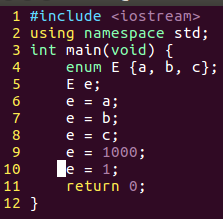5.1-day01-C++语言语法基础
bank.cpp
#include<iostream>usingnamespace std;//namespace {void print (int money){cout << money << endl;}//}// 农行名字空间namespace abc {int balance =0;void save (int money){balance += money;}void draw (int money){balance -= money;}}namespace abc {void salary (int money){balance += money;}void print (int money){cout <<"农行:";::print (money);}}// 建行名字空间namespace ccb {int balance =0;void save (int money){balance += money;}void draw (int money){balance -= money;}void salary (int money){balance += money;}}int main (void){usingnamespace abc;// 名字空间指令save (5000);cout <<"农行:"<< balance << endl;draw (3000);cout <<"农行:"<< balance << endl;ccb::save (8000);cout <<"建行:"<< ccb::balance << endl;ccb::draw (5000);cout <<"建行:"<< ccb::balance << endl;using ccb::salary;// 名字空间声明// using abc::salary;salary (6000);cout <<"建行:"<< ccb::balance << endl;abc::print (abc::balance);return0;}

先进行编译,然后再取别名运行文件;
g++ bank.cpp
g++ -o bank bank.cpp
./bank
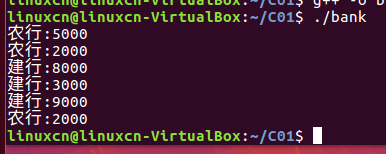
std:: 名字空间:
作用域限定运算符,相当于:“的”字符。
bool.cpp
#include<iostream>usingnamespace std;void print (bool sex){if(sex)cout <<"男生"<< endl;elsecout <<"女生"<< endl;}int main (void){bool b =true;cout <<sizeof(b)<< endl;cout << b << endl;b =false;cout << b << endl;b =3.14;cout << b << endl;char* p = NULL;b = p;cout << b << endl;cout << boolalpha << b << endl;bool sex;sex =3;print (sex);return0;}

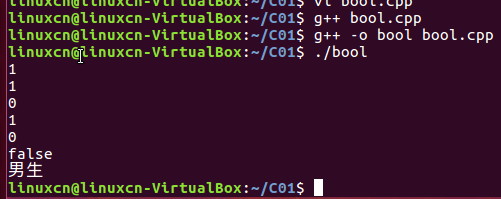
-----------------------------------------------------

因为,char *p = null, b = p; 此时,boolalpha = false;
boolalpha以字符显示方式进行格式控制;
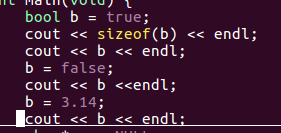
因为b是bool类型的,b = 3.14 , cout << b << endl; 后的值为1.
--------------------------------------------------

sex = 3 是bool类型的,猜测sex是True,男生”;
--------------------------------
验证:

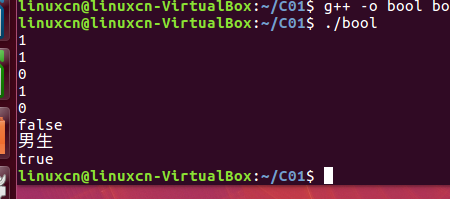
----------------------------
sizeof(空结构)-> 1
cfunc.c
void foo (int a){}
defarg.cpp
#include<iostream>usingnamespace std;void foo (int a =10,double b =0.01,constchar* c ="tarena");void foo (void){}void bar (int){cout <<"bar(int)"<< endl;}void bar (int,double){cout <<"bar(int,double)"<< endl;}int main (void){foo (1,3.14,"hello");foo (1,3.14);foo (1);// foo (); // 歧义bar (100);bar (100,12.34);return0;}void foo (int a /* = 10 */,double b /* = 0.01 */,constchar* c /* = "tarena" */){cout << a <<' '<< b <<' '<< c << endl;}
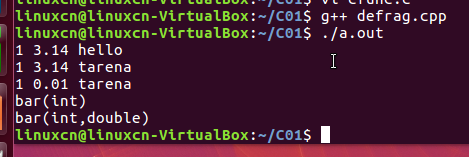
-----------------------
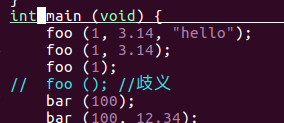

重载:在同一作用域中,函数名相同,参数表不同的函数,构成重载关系
int foo (int a, double b) {}
int foo (int b, double a)
函数名相同,参数名相同的不构成重载关系;
关注的是参数表的类型,不关心其名字;
重载解析:
(1)最优匹配原则;
(2)最小工作量原则;
函数名标识的是函数的地址,C++中函数名 可以重复,但是地址不一样。
const char * c= "tarena" 表示缺省值;缺省值一律靠右;
缺省参数放在声明语句当中 ,声明是给编译器看的;

重载:需要用同一个函数(函数名是死的)来实现两个不同的功能;
v1 : void decode (int arg) {...}
v2: void decode (void) {}
---------------------------------------------
两个不同 函数用同一个名;
只有类型而没有名字的形参,渭之“哑元”。
占着位置而不起任何作用;
--------------------------------------------------
gcc -std=c++ 0x
使用2011标准去编译;
g++ 1.cpp -std=c++ 0x
--------------------------------------------
(1)如果调用一个函数时,没有提供实参,那么对应的形参就取缺省值;
(2)如果一个参数带有缺省值,那么它后面的所有参数都必须都带有缺省值;
(3)如果一个函数声明和定义分开,那么缺省参数只能放在声明中;
(4)避免和重载发生歧义;
(5)只有类型而没有名字的形参,谓之哑元;
enum.cpp
#include<iostream>usingnamespace std;int main (void){enum E {a, b, c};E e;e = a;e = b;e = c;// e = 1000;// e = 1;return0;}

在这种 情况下,程序可以顺利进行编译;
hello.cpp
#include<iostream>int main (void){std::cout <<"Hello, World !"<< std::endl;int i;double d;char s[256];// scanf ("%d%lf%s", &i, &d, s);std::cin >> i >> d >> s;// printf ("%d %lf %s\n", i, d, s);std::cout << i <<' '<< d <<' '<< s <<'\n';return0;}


输出: cout - 标准输出对象;(控制台输出对象)
输入: cin - 标准输入对象;
插入运算符: << (把字符串的字面值插入到cout内)
提取运算符: >>
std::cout(控制台输出对象) << "Hello,world !" <<(多次插入) std::endl;(换行\n)
math.cpp
extern"C"{int add (int a,int b){return a + b;}int sub (int a,int b){return a - b;}}/*extern "C" int add (int a, int b, int c) {return a + b + c;}*/
calc.c3
#include<stdio.h>int add (int,int);int main (void){printf ("%d\n", add (10,20));return0;}
nsover.cpp
#include<iostream>usingnamespace std;namespace ns1 {int foo (int a){cout <<"ns1::foo(int)"<< endl;return a;}};namespace ns2 {double foo (double a){cout <<"ns2::foo(double)"<< endl;return a;}};int main (void){usingnamespace ns1;usingnamespace ns2;cout << foo (10)<< endl;cout << foo (1.23)<< endl;using ns1::foo;cout << foo (10)<< endl;cout << foo (1.23)<< endl;using ns2::foo;cout << foo (10)<< endl;cout << foo (1.23)<< endl;return0;}
using ns1::foo;
ns1中的foo被引入到作用域中了;
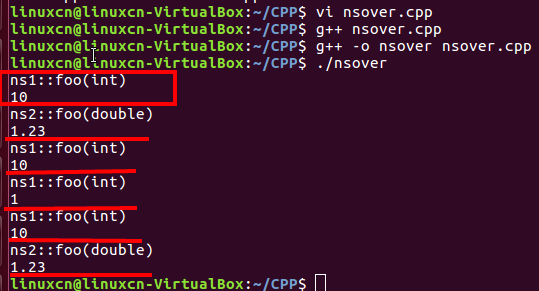
overload.cpp
#include<iostream>usingnamespace std;void foo (int a){cout <<"foo(int)"<< endl;}void bar (int a){}//int foo (int a) {}int foo (int a,double b){cout <<"foo(int,double)"<< endl;}int foo (double a,int b){cout <<"foo(double,int)"<< endl;}//int foo (int b, double a) {}int main (void){foo (100);foo (100,1.23);foo (1.23,100);// foo (100, 100);return0;}

struct.c
#include<stdio.h>int main (void){struct A {};printf ("%d\n",sizeof(struct A));struct A a;struct A* pa =&a;printf ("%p\n", pa);return0;}

C语言中的空结构大小为0;
struct.cpp
#include<iostream>usingnamespace std;structStudent{char name[128];int age;void who (void){cout <<"我叫"<< name <<",今年"<< age<<"岁了。"<< endl;}};int main (void){Student student ={"张飞",25},*ps =&student;student.who ();ps->who ();struct A {};cout <<sizeof(A)<< endl;return0;}

C++中类和结构没有区别;
sizeof (空结构) -> 1;
union.cpp
#include<iostream>usingnamespace std;int main (void){// 匿名联合union{int x;char c[4]/*= {'A', 'B', 'C', 'D'}*/;};cout <<(void*)&x <<' '<<(void*)c << endl;x =0x12345678;for(int i =0; i <4;++i)cout << hex <<(int)c[i]<<' ';cout << endl;return0;}



gcc -std=c++0x 使用2011编译器去编译;-2011标准;
<wiz_tmp_tag id="wiz-table-range-border" contenteditable="false" style="display: none;">
